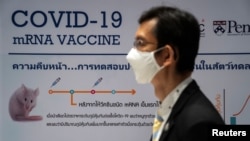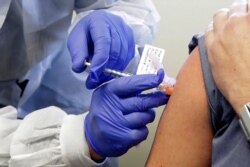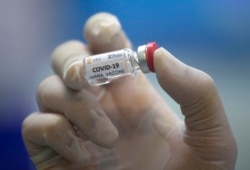Thailand says it may be ready to begin human trials of a homegrown coronavirus vaccine by October, following promising results with mice and monkeys.
"We anticipate that ideally it's October, or within Q4 of this year," said Kiat Ruxrungtham, head of the vaccine research center at Thailand's Chulalongkorn University leading the trials.
If all goes well, he added, mass production could start by the third or fourth quarter of next year.
Scientists across the globe are scrambling to develop a vaccine that can beat back the COVID-19 virus, hoping to whittle a process that typically takes years down to months. About 180 vaccines are in development. More than 20 of them have already gone on to human trials, with some countries aiming to have a vaccine approved by the end of this year.
Most frontrunners are in richer countries, mainly in the West, leaving the less well-off worried they'll be pushed to the back of the line when a vaccine is finally rolled out.
Recent history gives Thailand cause to fret. When H1NI swine flu hit Asia in 2009, a vaccine was ready within months. Thailand struck deals with overseas developers to buy 2 million doses, but they arrived only after the pandemic had passed. By the time it was over, the virus had infected more than 47,000 Thais and killed 347.
"We got it ... after the pandemic [had] gone. So that [was] one of the lessons learned," Kiat said.
That lesson was that Thailand should not rely on others to fight its way out of the next pandemic. It's the main motive behind the country's push for a vaccine against COVID-19, said Sophon Iamsirithavorn, director of the communicable diseases division in the Thai Public Health Ministry.
"Since the demand for [a] vaccine will be very high, if Thailand can develop a vaccine and have our own vaccine manufacturing in the country, it will guarantee [an] adequate amount," he said.
"If we want to buy it from other vaccine companies, it may take a longer time to get the vaccine that we need for a significant proportion of the population."
The trials make Thailand one of the few developing countries in the hunt for a coronavirus vaccine.
Kiat said his team's vaccine convincingly boosted antibodies to the coronavirus in two rounds of trials each on mice and monkeys. To gauge its potency in humans and discern the right dosing, they will start injecting 90 volunteers ranging in age from 18 to 80 with low, medium and high doses in the next few months. If the vaccine continues to prove its mettle, a second phase of human trials with 1,000 volunteers would begin by early next year.
Human trials would normally move on to a third and final phase with several thousand volunteers after that. However, given the urgency, Kiat said the Thai Food and Drug Administration could decide to skip that step and grant emergency use authorization for mass production if the second phase goes well and other governments have already approved coronavirus vaccines developed using similar technology.
Even then, other vaccines are likely to make it to market well before Thailand can ramp up the manufacture of its own design.
Sophon said another, and possibly speedier, route by which Thailand could get its hands on enough doses is to strike deals with the developers of those other vaccines to manufacture them in Thailand by way of technology transfer.
"If one of those successful candidates matches with the capacity in Thailand then I think technology transfer could be another very good way to ramp up production within Thailand and get more vaccine doses," said Renu Garg, a medical officer with the World Health Organization's country team.
Some Western developers have pledged to make their vaccines widely and quickly available when ready. India's Serum Institute says it will distribute 1 billion doses of a leading candidate in Britain just for other low- and middle-income countries, 40% of them by the end of the year.
The WHO is also working with the Global Alliance for Vaccines and Immunization, which helps to vaccinate children in developing countries, on a plan that would see richer countries pay for vaccine doses in poorer ones. They hope to have distributed 2 billion doses by next year. Garg said Thailand has shown interest in benefitting, but added that any one country will get enough doses for no more than 20% of its population, hopefully enough to cover its health care workers and others at high risk.
Thailand will want more. Having thus far weathered the global pandemic with fewer than 3,300 confirmed cases among a population of nearly 70 million, Sophon said the country has nearly none of the herd immunity that might come from mass infection. To protect the entire country, he said, it will need to inject nearly half its people with a vaccine.
"We have [a] very low level of transmission, so the number of people who are susceptible [is] probably over 95%. So that's why if we want to make herd immunity in Thailand we need at least 30 million doses," Sophon said.
To get there, Thailand believes it will need to make its own vaccine.


